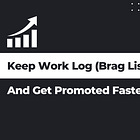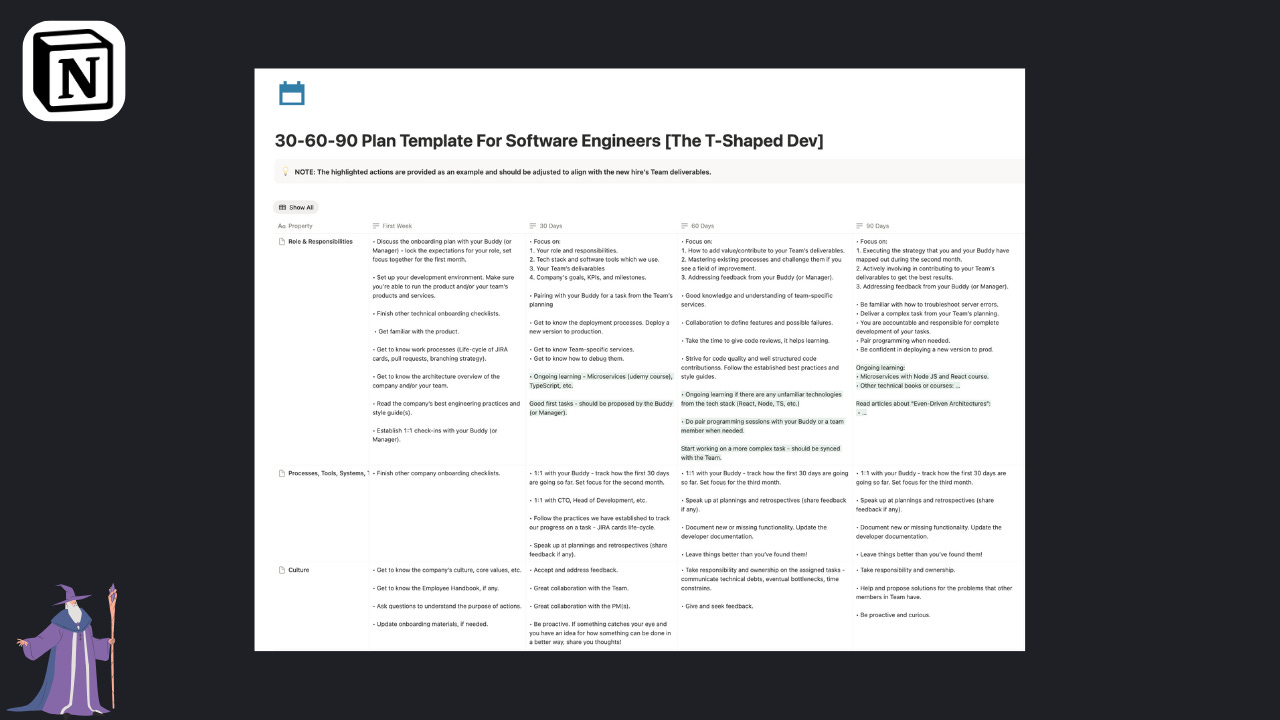Own Your Onboarding: The First 90 Days That Define Your Career 🚀
🎁 Notion Template: 30-60-90 plan template included! (6 min)
Starting a new job is challenging.
You’re changing your current environment, including your teammates, office, and so on.
You’re also not sure how it would impact your career.
So yes, it’s a bit nerve-racking.
Till now, I’ve changed more than four tech companies, ranging from startups to big tech unicorns.
I’ve seen different onboarding plans and ways to kick off your “first impression” in your new workplace.
One of the biggest lessons I’ve learned for myself is:
Don’t rely on your company’s onboarding plan. Create one for yourself!
Regardless of the company's size and seasonality, there are many flaws.
It’s hard to create the “complete” plan for every new joiner.
That’s why it’s crucial to take ownership of your onboarding plan.
The effort you put in now will pay dividends for months.
A strong start makes you appear to be someone who cares.
This sense of ownership shows professionalism.
In today’s article, I’ll share ten lessons I’ve learned in my career on how to successfully onboard in your new company.
I also shared and applied these lessons with all the people I managed to onboard as an Onboarding Buddy.
I saw the work, so that’s why I’m sharing these lessons with you.
Before Day 1: Set Yourself Up For Success
If you have a long notice period, reach out to your future manager or team before you start.
Ask what you can do to prepare before your first working day.
When I did that at my last company, they sent me a Udemy course on microservices architecture - a core part of their tech stack.
On Day 1, I showed up already speaking “their language”.
This shows two things: you actually prepare and you signal you are proactive.
Also, start a work log or brag document from Day 1.
Write down what you’re working on, problems you solved, your wins, and impact.
This becomes invaluable for 1:1s, performance reviews, and promotion discussions.
You can read more about it here:
Week 1-4: Learn Fast, Contribute Faster
Ship Code Early
I truly believe in getting your hands dirty immediately.
Aim to ship something in the first week, even in the first few days.
You might fix a bug, add a small feature, improve something in the codebase, or even add a formatting or linting rule.
I’ve worked in both frontend and backend, so when I joined my last company, I looked for bugs I could fix in both areas.
In my first week, I managed to raise the bar high by making an impact by starting to deliver.
During my first retro, the team said like I’d been there for months, not days.
There’s usually a “capacity penalty” when someone new joins.
You reduce this penalty by contributing quickly.
Another tip here is to:
Maintain your focus while exploring the codebase.
Don’t try to understand the entire codebase from the beginning.
Pick one area and start from there.
Start Reviewing Code Immediately
You might not understand the business domain yet, but you can still add value.
You can still share tips and tricks on code reviews related to software design, architecture, and engineering practices, like readability, testing, etc.
This shows that you care.
You also build your credibility as an expert in a particular field.
As you learn more about the product, you can begin to question requirements and suggest more effective approaches.
Ask Questions; Ask Even More
Your questions reveal what you care about. Ask good ones!
For example:
How do we make money?
How do we handle payments?
What are our team’s responsibilities?
etc.
Ask your buddy, your mentor, your team, or people outside your team.
And try not to eat lunch alone.
I’m an introvert, so this was hard for me.
However, I tried to eat at least twice a week with people outside my team.
This way, I met more smart people, heard different perspectives, and learned about challenges across the company.
Align on Expectations
On your 1:1s with your manager, sit down and clarify your goals:
What does success look like in my first month?
What about the next three months?
How to progress further in the career ladder?
Get specific.
Vague goals lead to vague results.
A good starting point is to create your 30-60-90 plan in a document.
This document maps out a new hire’s expectations from the perspective of the onboarding Team within the first 90 days of his new role.
🎁 Notion Template: Work Log (aka Brag List) Template For Software Engineers
Use this template to create your own work log (brag list) and list of accomplishments.
Paid subscribers, you can get it here:
Month 2-3: Build Your Network and Increase Impact
Map The Organization
This is especially helpful for Senior+ roles.
The main idea here is to get to know the different teams, their responsibilities, and their core domains.
Since you’re new to the company, you have the perfect excuse to message someone from this team and ask what they’re working on:
“Hi, I’m new here, and I heard about your team lately. I’d love to learn what you work on and how our teams might interact…”
This is incredibly easy as a new person, and gets much harder later. Use this window.
Understand The Business, Not Just The Code
Learning the tech stack is one challenge.
Understanding the business and product domain is another.
The best engineers combine technical knowledge with business context.
If you don’t understand the product well, you can’t build the right solution.
If the product doesn’t work, the code doesn’t matter.
Talk to product managers and more experienced engineers.
Try to understand the business.
And try to work on high-impact things.
This isn’t always possible—sometimes you have to fix boring bugs—but communicate with your manager about your impact.
Use Your Fresh Perspective
You see things that others have become blind to.
Something that doesn’t make sense to you probably doesn’t make sense at all.
Others just got used to it.
When you spot something that could be improved, document it.
Better yet, fix it yourself if you can.
Seek opportunities to make a positive impact.
Apply your fresh perspectives not only to the code, but also to the current processes, including onboarding.
Accept The Entropy
Accept that many things won’t make sense at first, especially if you’re going from a small to → big company.
This is completely normal.
Give it time. It gets clearer.
📌 TL;DR
Reach out to your manager before you start. Ask for materials to prepare.
Start your brag document from day 1.
Contribute code in week 1.
Start code reviews immediately.
Ask questions.
Try to eat lunch with people from different teams.
Align on goals with your manager.
Map important teams.
Learn the business, not just the code.
Apply your fresh perspective.
Hope this was helpful.
See you next time!
👋 Let’s connect
You can find me on LinkedIn, Twitter(X), Bluesky, or Threads.
I share daily practical tips to level up your skills and become a better engineer.
Thank you for being a great supporter, reader, and for your help in growing to 28K+ subscribers this week 🙏




“Don’t rely on your company’s onboarding plan, create one yourself.”
This alone separates top performers from everyone else.